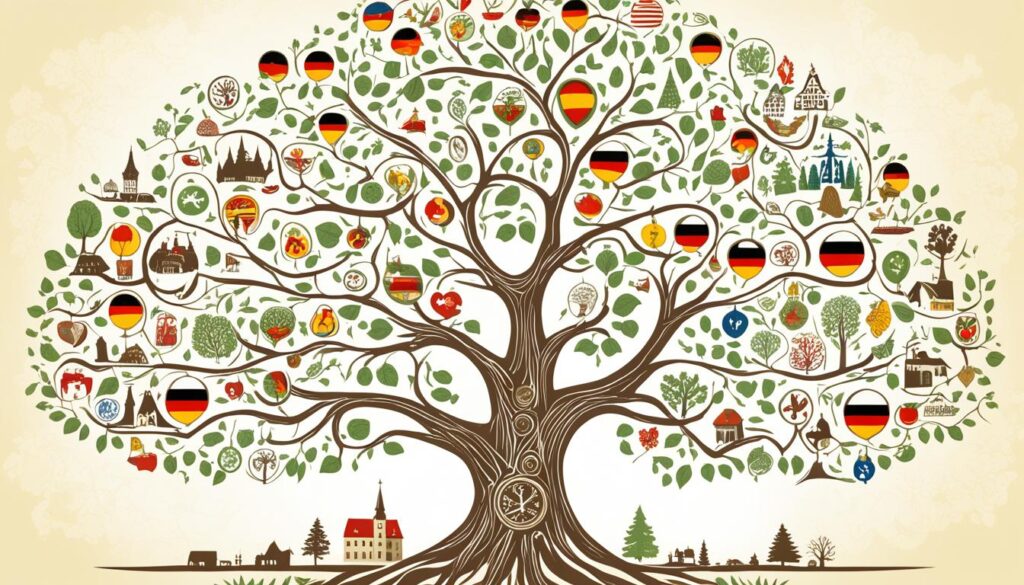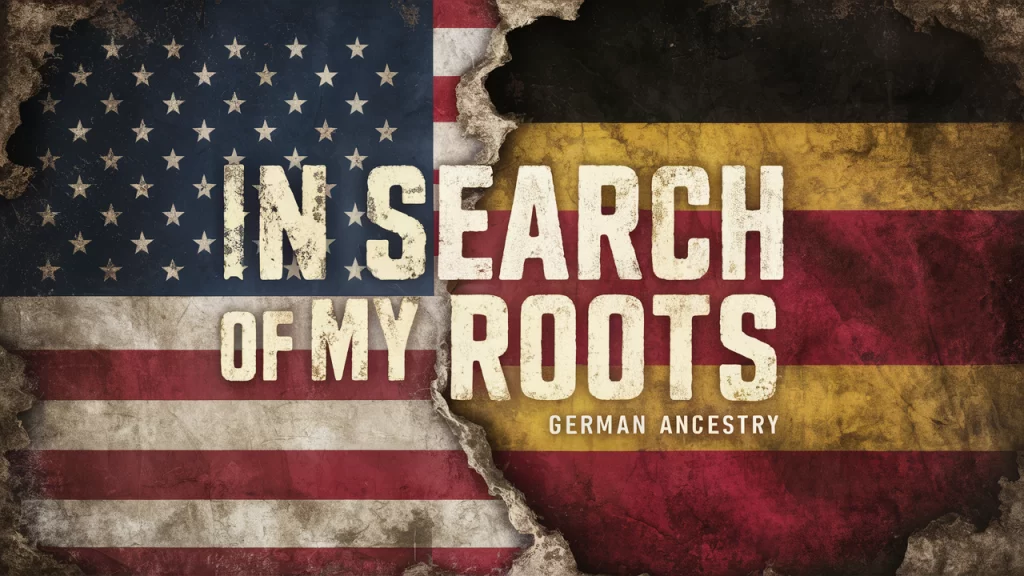German Ancestry Tracing: How to Research Your Family History
GERMAN HERITAGE USA | AFFILIATE DISCLAIMER: This post may or may not contain affiliate links which means we may receive a commission for purchases made through links. We will only recommend products that we have personally used or that we truly trust. Learn more on our Private Policy and Disclaimer Page located under our Terms Of Service tab above.
Researching your German roots is a journey full of rewards. This guide will show you how to trace your German Heritage in America. It includes tips on finding family records and using genealogy tools online. These steps will help you dig into your German ancestry and get in touch with your heritage. No matter if you’re just starting or want to dig deeper, this article is here to guide you in discovering your family’s unique story.

Key Takeaways
- The United States has conducted censuses every ten years since 1790, providing a wealth of ancestral data.1
- German civil and church records can date back centuries, though strict privacy laws limit access.1
- Navigating Germany’s historical regions and evolving borders is crucial for effective German ancestry research.1,2
- Online resources like MeyersGaz.org, Kartenmeister, and Compgen.de can aid in locating ancestors’ hometowns.2
- Professional genealogists with specialized German research expertise can provide invaluable guidance.
Uncovering Your German Roots
Looking into your German family history is much more than a pastime. It’s about finding yourself through understanding where you come from. This journey shows you your family’s past, their culture, and your personal story. You’ll learn about your ancestors’ lives, traditions, and what made your family who they are. Doing this can help you feel closer to your heritage and proud of your German and American mix.
The Importance of Tracing Your Ancestry
Start by talking to family members. Even distant relatives might have old family items that hold clues. These could be family Bibles, certificates, or letters. Such personal items often carry important details about your ancestors, like when and where they were born, got married, and passed away.
This information is key and will kick-start your search.
Starting Your Journey: Gathering Family Records
In today’s world, there are many digital tools for tracing your German roots. Websites, including RootsWeb and FamilySearch, are great starts. They give you access to a wealth of historical information. For example, you can find old records and ship logs that shed light on your ancestors’ lives.3 These sites let you do specific searches and offer maps to help you explore your family’s history.

Utilizing Online Genealogy Resources
With services like AncestryDNA, you can dig even deeper. This type of DNA test connects you to various German and European communities based on your genetics.3 Pairing this with an Ancestry membership opens the door to more info. The service recently added 266 communities specific to Germanic Europe. This makes it easier for those of German descent to find their roots.3
In a specific scenario, the DNA test was able to link someone to the Pomeranian and Mecklenburg regions.3 Using records from Eastern Prussian Provinces, Germany [Poland], individuals could find more. Details like date of birth, parents’ names, and spouse’s information can be uncovered.3 The availability of records, such as the 1819 Mecklenburg-Schwerin, Germany Census, is highlighted. Records from this particular census include people like Ferdinand Stiller.3
Exploring Courthouse and Church Records
Looking at and can really help you find your German family history. These records are kept by local governments and churches. They show important information like names, dates, and places. This info helps you see your family’s history more clearly and might help you find more to add.4

Uncovering Birth, Marriage, and Death Records
Cemeteries and tombstone markers are full of clues. You can find names, dates, and where your ancestors came from. Look into often has details on who is buried where and how families are related. This extra info can really boost your genealogy research.4
Navigating Gravestone Inscriptions
Studying can really add depth to what you know. They talk about your family’s life, who they knew, and their wealth. Knowing roughly when something happened helps a lot when looking through newspapers. But they give a special look into how your German relatives lived.4
Newspaper Archives: A Treasure Trove of Information
By checking various old records, from town to newspapers, you’ll learn a lot. These resources tell stories and give personal details about your German ancestors. They can help you understand your family’s past better and feel closer to your German roots.
Leveraging Government Archives
The U.S. government has a lot of records that help find your German roots.5 The most important are the federal census records. They’ve been carefully collected every ten years since 1790.5 In these documents, you can find details about your family. Things like their names, where they were born, jobs, and who was in their family. This info helps you build a timeline of your family’s journey and learn more about their American lives.
U.S. Census Records: A Wealth of Ancestral Data
There are also naturalization records and passenger lists in the archives. They give important info about your German family members’ travels to America.5 Naturalization papers tell you where someone is from and when they came to the U.S. They also show the steps for becoming a citizen. On the flip side, passenger lists show the ships and ports your family used when they moved here.
Naturalization Records and Passenger Lists
If you have German family who were in the U.S. military, you’re in luck.5 Military papers have info about their service. You can see where they served, their position, and battles they were part of. These records are not only a look into your heritage but show the contributions your German-American ancestors made.
Military Records: Tracing Your Ancestors’ Service
Locating Your Ancestors’ German Origins
Finding where in Germany your ancestors came from can be tough. The country has had a lot of changes over the years. There were changes in borders, the birth and death of small states, and then the establishment of the German Empire in 1871.1 Knowing this background helps a lot when you’re beginning your search. It tells you where to start looking.
Understanding Historical German Territories
1 In Germany, the states used to be made up of kingdoms, duchies, and other areas. You can find a lot of records in local archives. Knowing about these regions’ history can lead you to your ancestors’ birthplace.
Navigating Name Variations and Spellings
1 One big challenge in German ancestry is the different names and spellings. When people migrated to the United States, they sometimes changed their names. This could be on purpose or because of language differences. Also, names of German towns and villages might have changed over time. This makes finding the exact place hard.1 Learning about these changes and being ready to search under different spellings is crucial. It can make your search much easier.
Utilizing German Genealogical Resources
When looking into your German roots, remember how many resources are available in the country.1 Registers from both churches and local governments are a goldmine. They hold details such as when your ancestors were born, married, and died.1 However, sometimes it’s tough to fish out this info because of the many languages and how these records are spread out.
Though not as common for tracing family history as they are in the U.S., German graveyards still have their use. Headstones and records can let you know more about your ancestors, like their names and vital dates.1 Paying a visit to where your German relatives are buried can make you feel closer to your family’s past. It also helps keep their memory alive.
Church and Civil Registers
1 The Deutsche Arbeitsgemeinschaft Genealogischer Verbände e.V. (DAGV) acts as a hub for many German genealogical groups.1 Civil records in Germany have been kept since the Napoleonic era, while church documents go back as far as the 15th century.1 Note that names might have different spellings over time due to dialects and literacy challenges.
Cemetery Records
1 Unlike the U.S., in Germany, grave spaces are rented for a set amount of time. This can influence how easy it is to find burial records.1 Remember, today’s areas within Germany once were separate places. So, your search might lead you across today’s borders for full family history details.
Regional Genealogical Associations
There is a whole network of groups focused on helping with German family history research. These groups, organized by region, have their own sets of archives and knowledge. They can be your go-to for local historical info and tips on digging up more about your German past.1 Talking to these associations not only opens the door to rare resources but also lets you connect with fellow family tree enthusiasts.
German Ancestry
Tracing Your German Heritage
Tracing back your German roots is a quest that goes beyond research. It’s a journey into your very being, exploring your family’s culture and identity.6 You will get to know the stories and lives of your German ancestors. This can tie you closer to where you come from.
It makes you feel like you truly belong, increases your love for your German-American background, and encourages you to honor your family’s history and customs.
Connecting with German Culture and Traditions
Exploring your German background can help you find new joy in old traditions.7 You will encounter things like their food, songs, and ways they celebrate. This connection can make your identity stronger and bring your family closer together.6 Sharing these traditions with younger family members ensures your German culture lives on.
The German-American Experience
Learning about your German Heritage links you to a bigger story, the German-American tale.6 Many Germans came to the U.S., adding their tales and talents to the nation.6 As they embraced America, they kept their German essence. This mix of cultures is a unique part of the American story.6 Recognizing and enjoying this mix gives you a better understanding of both your heritage and America’s history.
Overcoming Research Challenges
Tracing your German roots can be tough because the country’s borders changed a lot. This happened as smaller regions came together or split apart.8 The movement of German people, called the “German diaspora,” adds to the challenge. It can be hard to find exactly where your ancestors lived. Knowing about these political and historical changes is key to dealing with this.
Boundary Changes and the German Diaspora
Reading old German documents might also pose a big challenge. They could be in hard-to-read scripts from the past or in the old German Kurrent.9 The German language has also changed over time. This makes it harder to find out about your family. Learning about these changes in language and writing is crucial.
Language Barriers and Script Variations
Dealing with Germany’s complex political history and language issues might look hard at first. But, with the right attitude and resources, you can find your family’s story. Knowing about the historical and language aspects will help you track your roots. It will also help you feel your German-American connection.
MeyersGaz.org is a top pick for tracing German roots. It grants access to a key resource: the Meyers Gazetteer for the German Empire.10 This tool aids in understanding old German writing and finding town locations on maps.
Searching for towns is made easier with MeyersGaz.org. It accommodates different name versions and wildcards. This is vital for managing the many names of German places.
MeyersGaz.org: Navigating German Town Records
Kartenmeister is also crucial for those with German roots, especially in Eastern Europe. It focuses on towns in areas now part of Poland, like East Prussia.11 These regions have seen borders change and names evolve, making research tough. Kartenmeister lets you find towns using their old German and current Polish names, making it easier to locate where your ancestors came from.
Kartenmeister: Exploring Eastern Prussian Towns
Compgen.de, also called Genealogy.net, is key for digging into German ancestry.12 It features a History Gazetteer, covering much of Europe, including former German lands. This helps researchers understand the political and religious history of towns and how they changed over time.
Compgen.de: A Comprehensive Genealogy Database
Professional Genealogical Assistance
Online tools can help a lot with your German family tree. But sometimes, it’s good to get help from a pro.13 Expert genealogists know how to tackle issues like old records, language, and history changes. They bring a wealth of knowledge.
Hiring Experts for German Research
13 Sometimes, hiring a researcher can solve tough genealogy puzzles.13 It’s wise to weigh the cost of a researcher against travel expenses.13 Look to groups like the APG in the US or the German-speaking APG in Germany for skilled help.13 When you hire, ask for references, talk about the plan, and agree on the cost.13 You have to pay the researcher, even if they don’t find what you wanted.13 They take various payments, including PayPal and credit cards.13 So think about the research’s value, the expert’s skills, and the fees.
13 Real-life cases show how hiring an expert can be worth it.
Accessing Microfilmed Records
Pro genealogists not only know a lot but also have unique access. They can get to microfilmed records that most can’t find on the web.13 Through their connections, they dig up important data and documents. This can be hard for solo researchers to do.

Building a Legacy
Exploring your German roots is a journey worth taking. It’s about more than just learning about your family’s past. It’s about keeping that heritage alive for your children and grandchildren.14
Preserving your family’s story can mean making digital copies of old records and photos. It’s also about sharing the special stories and traditions that make your family who they are. This keeps the German part of your identity strong over time.
Preserving Your Family’s German Heritage
Keeping your German heritage alive is key to your family’s legacy.14 Start by digitizing important documents like birth or marriage certificates. This makes them last longer and easier to share.
Telling stories of your family’s past helps keep your culture alive. It also helps you and your family understand and value your roots more deeply.
Sharing Your Discoveries with Relatives
Sharing what you find with your family is just as important.15 This means reaching out to cousins, aunts, uncles, and anyone else related to you – even those living in Germany.
Working together and talking about your heritage can bring your family closer. It builds a strong sense of family pride that lasts for generations.
Continuing in your family’s footsteps allows their memory to stay alive. It also inspires others in your family to learn and cherish their heritage.
Conclusion
Exploring your German roots is rewarding. It offers deep knowledge about your family’s history and who you are.16 Use online databases, government records, and genealogy experts to learn more.16 Don’t forget to enjoy your family’s unique ways. And share what you learn with family. This will create a strong heritage that celebrates both German and American cultures.166
With effort and an open mind, finding your German roots can be transformative. It sheds light on your past and shapes your future.16 Explore the dynamic history and lasting impact of German-Americans.166 Their story shows their strength and what they’ve added to America. By tracing your family’s story, you’re part of this rich history.
Continuing to uncover your German-American roots is important. It’s something to be proud of and it links you to a culture full of stories, traditions, and successes.166 Keeping your heritage alive is a way to ensure your family’s legacy continues. This impacts future generations and leaves a lasting impression on the country.
FAQ
What is the importance of tracing your German ancestry?
Discovering your German roots can be enlightening and rewarding. It gives you insight into your family’s past and cultural heritage. You may also find connections to your own story through your ancestors’ experiences and traditions.
How can I start my journey in researching my German ancestry?
The first step is talking to relatives. Ask for family records or any information they have. They might share old documents that can shed light on your ancestors.
What online resources are available for German ancestry research?
Platforms like RootsWeb and FamilySearch are great for finding historical records. Websites such as MeyersGaz.org and Kartenmeister can help you track down specific information about your German ancestors.
How can traditional sources like courthouse and church records help in tracing German ancestry?
Local records like birth and death certificates can be key in your search. They often contain important details about your ancestors. These records can help you build the story of your family.
What information can I find in government archives when researching my German ancestry?
Government archives hold a wealth of information. This includes census data and military records. Such documents can uncover your ancestors’ experiences in the U.S.
What are some of the challenges in locating the specific German origins of my ancestors?
There are many challenges, like changing borders and names. These can make it hard to know exactly where your ancestors came from. Plus, different spellings of names can add to the confusion.
What resources are available within Germany to help with my ancestry research?
Germany itself has valuable records in churches and civil offices. But getting to these documents can be hard because they’re in different places and languages.
How can I overcome the language and script barriers in my German ancestry research?
Learning about old German language and scripts is crucial. This knowledge will help you understand historical documents. Websites like MeyersGaz.org can also be useful.
When should I consider seeking the help of a professional genealogist for my German ancestry research?
If you reach a point where the research gets very complex, consider a professional. They can tackle difficult tasks and guide you through challenges that might be too hard to solve alone.
How can I preserve and pass down my German heritage for future generations?
Digitalize and save old family records is a good start. Also, create a record of your family’s unique tradition. This will help keep your German Heritage alive for your children and grandchildren.
Source Links
- https://howtogermany.com/culture/german-culture/genealogy/
- https://www.legacytree.com/blog/3-essential-websites-german-ancestors
- https://blogs.ancestry.com/cm/german-dna-communities/
- https://familytreemagazine.com/heritage/german/german-church-records-guide/
- https://obamawhitehouse.archives.gov/omb/fedreg_race-ethnicity
- https://en.wikipedia.org/wiki/German_Americans
- https://en.wikipedia.org/wiki/Germans
- https://familytreemagazine.com/heritage/conquering-the-continental-divide/
- https://genealogyvoyage.com/cultural-ancestry/german/overcoming-challenges-in-german-genealogical-research/
- https://ancquest.com/
- https://www.familysearch.org/en/wiki/Silesia_(Schlesien),_Prussia,_German_Empire_Genealogy
- https://www.archives.gov/research/genealogy/start-research/nara-resources
- https://steveszabados.com/2022/04/27/hiring-a-german-researcher/
- https://www.legacytree.com/blog/intro-to-german-genealogy-tips-for-family-history-research
- https://www.maryloumontgomery.com/single-post/2019/12/14/german-family-worked-together-in-order-to-build-a-lasting-legacy
- https://nhlrc.ucla.edu/nhlrc/article/150269

